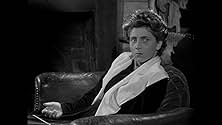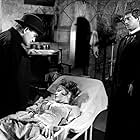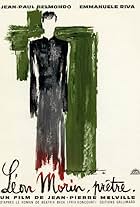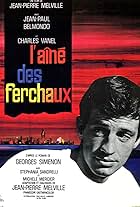In occupied France, an elderly man and his niece are forced to give shelter to a German army lieutenant who seemingly loves their country and culture.In occupied France, an elderly man and his niece are forced to give shelter to a German army lieutenant who seemingly loves their country and culture.In occupied France, an elderly man and his niece are forced to give shelter to a German army lieutenant who seemingly loves their country and culture.
- La nièce
- (as Nicole Stephane)
- La fiancée
- (as Ami Aaroe)
- L'Allemand
- (as Fromm)
- L'Allemand
- (as Vernier)
- L'Allemand
- (as Schmiedel)
- Director
- Writers
- All cast & crew
- Production, box office & more at IMDbPro
Storyline
Did you know
- TriviaWhen the author of the original novel, Vercors, objected to Melville adapting his book without obtaining the rights, the filmmaker made him a deal. The filmmaker would go ahead and make the film without permission, and when it was complete, Vercors would arrange a screening of it for 24 former Resistance members. If even one of the 24 objected to the film, he, Melville, would personally burn the negative in front of Vercors' own eyes. When Vercors arranged the screening, he assumed that only 26 people would be present: himself, Melville and the 24-member "jury." However, much to Vercors' chagrin, Melville "stacked the deck" by instructing his publicist to invite many prominent critics and literary figures, including André Malraux and Jean Cocteau (whose novel Melville would later adapt into the film The Terrible Children (1950)), although Melville feigned innocence in the matter. Of the 24 "jury" members, one dropped out just before the screening, and the editor of the French newspaper Le Figaro was recruited as a replacement. When the film was over, 23 voted in favor of the film and only one against: the Le Figaro editor. However, when Vercors discovered that the man had voted against the film not because of the work itself, but because his vanity was offended at being a last-minute substitute, Vercors discounted his vote, and the film was saved.
- Quotes
Werner von Ebrennac: There's a lovely fairy tale that I've read, that you're read, that everyone has read. I don't know if the title is the same in your country. We call it, "Das Tier und die Schöne", "Beauty and the Beast". Poor Beauty, she is at the mercy of the Beast, powerless and imprisoned. She is subjected to his implacable, heavy presence all day long. Beauty is proud, dignified, she has become hard. But the Beast is better than he seems. He doesn't have the finest manners. He is tactless, brutal. He seems vulgar next to the refined Beauty. But he has a heart. Yes, a soul which aspires to higher things. If Beauty wished it so...
- ConnectionsFeatured in Melville Steps Out of the Shadows (2010)
Officer Werner von Ebrancc in fact will talk to them or, perhaps, in a way, to himself without any regard. For the most part, with maybe just one or two minor exceptions, we only hear the uncle in voice-over. Lots and lots of voice-over, narrating about things that we see on screen and what the officer's silence holds over moments, or when he does things like play the harmonium - a melody that his niece hasn't played in years. So much significance in six months or so of this man just *being* there. What will they do? Will communication finally happen vocally, or with physical gestures and things like hands?
I imagine it'll be the same for those who come to La Silence de la Mer that admirers (does one say fans perhaps) of Jean-Pierre Melville's other films, primarily his 60's crime thrillers or the other WW2 resistance epic Army of Shadows: this does not really seem very much like those later movies. In 'Silence', it's got wall-to-wall musical score for one thing by Edgar Bischoff; not a bad score by any means, but it is strange and sometimes the music is accompanying one of the many monologues delivered by the German soldier Werner, which is in contrast to many of Melville's films which lack music in favor of silence. And there is a great deal of narration from the French uncle (just credited as 'L'Oncle' played Robain) which is also in contrast with Melville's style. So it was a little jarring to come to his first film after seeing so many - this doesn't make it a bad thing, just different and unexpected.
The context always matters of course: this was made very soon after the end of the second world war, which Melville fought in and was part of the French resistance. The film's adapted from a book, which is pretty clear by not only the framing (like a Cocteau film of Beauty and the Beast, which gets checked here in reference by the way by Werner, it opens and ends with a book on screen), and it was a book that was kind of an underground release. Melville even adapted it without the rights, something that would almost make it a "fan-film" today, though Vecors liked it enough to let it see release following approval from a 'jury' (see the trivia). But the point is that the film must have been something important to see in France at the time, part of France looking back at what had happened to them, what they allowed, and of course the fervent, dastardly German/Nazi mind-set, and take some steps to move forward.
The narration may be too much at times (it's part of Melville's 'anti-cinematic' aesthetic in relation to adapting a book to the tee), and at first I was bothered by it. It made the film seem old and dated. But as the film went on and I got more into Vernon's performance, it seemed to make more sense about the tension and how, step by step, incrementally, there's a connection made between these very disparate characters. I also liked the last half hour where we see Werner outside of the house and at German HQ or talking with fellow officers and the contrast of his own awakening to culture and French artistic expression with the dogmatic nature of Nazism. It's even a braze and courageously made movie ultimately for how it posits the French civilians like these two (not so much characters but apt props for the narrative) and Werner, who is fleshed out and conflicted and kind of a tragic figure. It's a film the more I think about it I like more, even as it's not as impressive as Melville's later crime films. For what he had to work with (clearly a low budget, mostly shot in the house), Melville gets a lot out of his imagery and slow-build up.
- Quinoa1984
- Dec 27, 2015
- Permalink
- How long is The Silence of the Sea?Powered by Alexa
Details
- Release date
- Country of origin
- Languages
- Also known as
- Tisina mora
- Filming locations
- Production companies
- See more company credits at IMDbPro
- Runtime1 hour 27 minutes
- Color
- Aspect ratio
- 1.33 : 1
Contribute to this page























